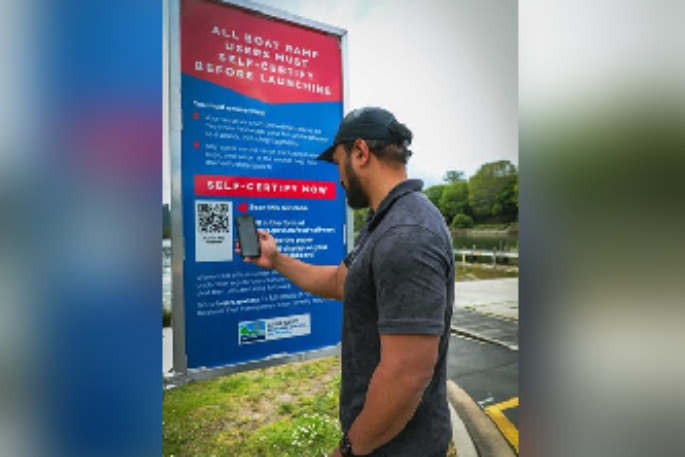“It’s the responsibility of every lake user to follow the rules to prevent gold clam or any other freshwater pest from spreading to the Rotorua Te Arawa Lakes this summer".
That’s the comment by Te Wakaunua Te Kurapa, Bay of Plenty Regional Council Biosecurity Officer, reflecting on the low levels of adherence to Rule 7 of the Bay of Plenty Regional Pest Management Plan (RPMP) 2020 – 2030: All boat ramp users are required to self-certify that their craft and trailer are free of freshwater pests.
"Based on current self-certification compliance statistics, people need to do better," says the officer.
“While there has been an improvement in people doing the right thing, only 40 per cent of the 960 boats checked at public boat ramps over the last few months have undertaken the self-certification requirements.”
With the discovery of the new-to-New Zealand Freshwater gold clam in the Waikato River in May, the current focus locally is on preventing the spread of this highly invasive freshwater pest to the Rotorua Te Arawa Lakes.
Local hapū, lakeside communities, Bay of Plenty Regional Council, Te Arawa Lakes Trust, and Rotorua Lakes Council are all working collectively with Biosecurity New Zealand to ensure locals and visitors alike are aware of what they need to do to protect the lakes.
Te Kurupa says that the new actions resulting from Biosecurity New Zealand creating two national Controlled Area Notices (CAN), in addition to Regional Council’s existing Bay of Plenty RPMP self-certification requirements, are necessary.
“It’s crucial for all lake users to comply with all the rules in place to prevent the inadvertent introduction of any freshwater pests,” says Te Kurapa.
"While it may take longer and require some pre-planning, particularly for those coming from the Waikato, there is plenty of information available.
"This includes leaflets to lakeside residents, signs on roads coming into town, local advertising and details on the Biosecurity New Zealand, regional and local council websites.
“To support this effort, lakeside self-certification at public boat ramps has been streamlined with the inclusion of QR codes on signage to enable digital self-certification, making it easier for lake users to comply with the rules."
Biosecurity Officers from Te Arawa Lakes Trust will also be present daily throughout the peak summer period and every weekend until April, to continue to ensure compliance and education.
"Preserving the beauty and health of Rotorua Te Arawa Lakes is a collective responsibility. We must work together to ensure that clean boats, not gold clams, are coming to the lakes this summer.”
Full details of the CANs currently in place can be found on the Biosecurity New Zealand website.
Controlled Area Notices (CAN)
Biosecurity rules are in place to stop the spread of the clam through a mechanism under the Biosecurity Act called a Controlled Area Notice (CAN).
Two CANs are in force: One for the Waikato River and another for the Te Arawa lakes, with additional protections for Lake Ōkataina.
Waikato River CAN
The Waikato CAN includes Waikato River from the Whakamaru Dam to the river mouth at Port Waikato, including Lake Karapiro. Requirements include:
- All wake boats that have been in the controlled stretch of the river must not be used in any other waterways, including parts of the river outside the controlled area.
- Recreational river users that have been in the controlled stretch of the river must continue to follow Check-Clean-Dry requirements for any craft, gear (such as fishing and other equipment used to gather kai) and equipment (including water skis, wakeboards, and inflatable pool toys).
Te Arawa lakes Controlled Area Notice
For all 14 Rotorua Te Arawa lakes
- Any boat that has been in the Waikato River in the previous 30 days must be cleaned at a designated wash station before entering the water. This is in addition to the Check-Clean-Dry requirements.
For Lake Ōkataina
- All boats must be cleaned at a designated wash station in Rotorua before entering the lake. This is in addition to the Check-Clean-Dry requirements.
Designated wash station
The designated wash station is Car Wash, The Wash Place, 338 Te Ngae Road, Rotorua. Located between Wendy’s and the Gull petrol station.
Regional Council Biosecurity Officer Te Wakaunua Te Kurapa demonstrates how to scan for easy self-certification.



0 comments
Leave a Comment
You must be logged in to make a comment.